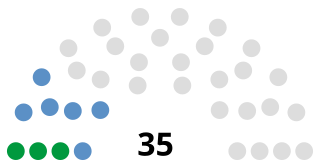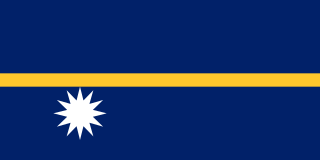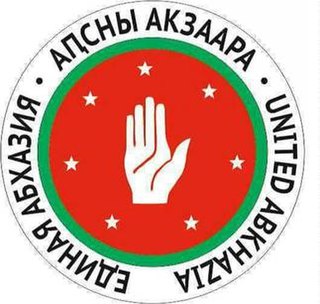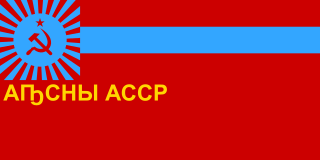Sergei Shamba is a senior politician from Abkhazia. He is currently a member of the People's Assembly of Abkhazia and Chairman of United Abkhazia. He was Prime Minister of Abkhazia under President Sergei Bagapsh from 13 February 2010 until 27 September 2011. Between 1997 and 2010 he had been Minister for Foreign Affairs under both Bagapsh and his predecessor Vladislav Ardzinba, with only a half-year interruption in 2004. Shamba has twice unsuccessfully participated in Presidential elections, in 2004 and 2011. He has been a staunch proponent for dialogue between Abkhazia and Georgia.
Beslan Butba is a businessman and a former Prime Minister of Abkhazia. He owns Abkhazia's only private television station Abaza TV and is the chairman of the Party of the Economic Development of Abkhazia. Butba was an unsuccessful candidate in the December 2009 presidential election.
On 12 February 2011, Abkhazia held local elections for the 5th convocations of its local assemblies.

A presidential election was held in the Republic of Abkhazia on 26 August 2011. This was the fifth such election since the post of President of the Republic of Abkhazia was created in 1994. The election was held to elect the successor of president Sergei Bagapsh who died in office on 29 May 2011.
The 4th convocation of the People's Assembly of Abkhazia was in place from 2007 until 2012.
The 3rd convocation of the People's Assembly of Abkhazia was in place from 2002 until 2007.
The 5th convocation of the Sukhumi City Council has been in office since 10 March 2011.

Valeri Ramshukhovich Bganba is an Abkhazian politician who has served as the Prime Minister of Abkhazia since 18 September 2018. Prior to that he was the Speaker of the People's Assembly of Abkhazia from 2012 until 2017. He was elected as speaker on 3 April 2012 and was succeeded by Valery Kvarchia on 12 April 2017. Bganba became acting President on 1 June 2014, following the resignation of Alexander Ankvab as a result of the 2014 Abkhazian political crisis. On 25 September 2014 he was replaced by Raul Khajimba, the winner of the presidential elections on 24 August.
Events in the year 2012 in Abkhazia.
Zaur Avidzba (1953–2015) was a politician and businessman from Abkhazia who was murdered in 2015.
On 3 April 2016, Abkhazia held local elections for the 6th convocations of its local assemblies in all districts except Gali.
The 6th convocation of the Sukhumi City Council has been in office since 13 April 2016.
Almas Japua is a deputy of the People's Assembly of Abkhazia. Japua was by-elected on 31 August 2014 in constituency no. 26 after sitting MP Beslan Butba had been appointed as acting Vice Premier in the aftermath of the 2014 Abkhazian revolution. Japua was nominated by an initiative group on 12 July and formally registered as candidate on 1 August. He defeated his opponent Amiran Kakalia with 889 votes to 848, out of 1761 votes cast. On 1 September, Japua was officially registered as a member of Parliament.
Beslan Eshba is a vice premier of Abkhazia and the head of a sociopolitical organization Apsadgyl. Prior to his current position, he was a deputy commander in the Sukhumi battalion and an advisor to the President of Abkhazia.
Aslan Kobakhia is one of three current Vice Premiers and the current Minister for Internal Affairs of Abkhazia.
Daur Arshba is a politician from Abkhazia. He is the Head of the Presidential Administration, having been appointed by President Raul Khajimba on 10 October 2016, and Chairman of the pro-government Forum for the National Unity of Abkhazia. In the past, he has served as Vice Speaker of the People's Assembly and as Head of Tkvarcheli District. Following the death of Gennadi Gagulia on 8 September 2018, Arshba was appointed Acting Prime Minister of Abkhazia, a position he held until 18 September 2018.
Kan Kvarchia is a member of the People's Assembly of Abkhazia.
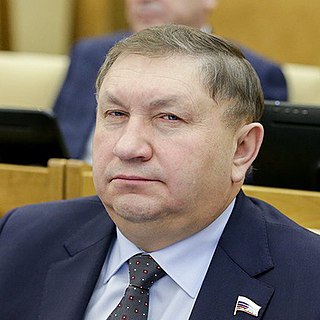
Legislative elections were held in Russia on 18 September 2016. On 5 October 2016 Sergey Naryshkin resigned because of his appointment as Director of SVR. On 14 June, the Central Election Commission scheduled an election in the Kingisepp constituency for 10 September 2017.

Legislative elections were held in Russia on 18 September 2016. On 10 June 2017 Vladimir Zhutenkov resigned. On 14 June, the Central Election Commission scheduled a by-election in the Bryansk constituency for 10 September 2017.

